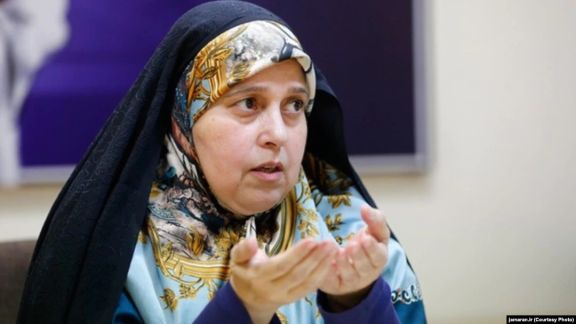Former Lawmaker Tells Iran's Parliament To Deal With Economic Crisis

A former lawmaker says the hardline majority in Iran's parliament is wasting time on a bill to restrict internet access instead of tackling the economic crisis.

A former lawmaker says the hardline majority in Iran's parliament is wasting time on a bill to restrict internet access instead of tackling the economic crisis.
"I believe lawmakers should be asked why they take up plans that will cause the closure of people's limited ways for communication … when economic problems affecting people's subsistence are serious and a [high] percentage of people live in poverty," Parvaneh Salahshouri told the Iranian Labour News Agency (ILNA) Monday. The outspoken female politician also drew attention to other ideological legislation parliament is toying with, instead of tackling issues such as 50-percent inflation and increasing poverty.
If approved in its current form, the controversial cyber regulation bill entitled ‘Legislation to Protect Cyberspace Users’ Rights’ will result in broad restrictions on social messaging platforms.
The proposed law requires foreign social networking and messaging corporations to appoint an Iranian representative and agree to comply with Iranian laws and regulations. To be licensed, such companies would be required to register subscribers and provide this information to the authorities.
Such a demand would most probably end up in blocking Instagram which is widely used by many large and small businesses. Other major social media apps, such as Facebook, Telegram, and Twitter are already blocked but are widely used through anti-filtering software.
Critics of the bill suggest it could undermine small businesses, with Iranians making at least 400,000 purchases daily through Instagram and the blocked Telegram.
Iran has been blocking thousands of websites and social media platforms since the early 2000s, both for religious and political reasons.
The Parliament's plans to restrict access to social networks could also hugely deprive opposition politicians of platforms to publish their views in the absence of free press.
Salahshouri noted that currently much of what people know about what lawmakers comes from the uncensored content available on social media. "How can we know what is [really] happening if this space is shut down?' she asked. "The necessity of eliminating this space [for dissemination of uncensored news and criticism] for them is evident."
The Parliament's own research arm tasked with improving the proposed bill warned the Special Committee to Investigate the Cyber-Regulation Bill last week that the proposed bill violates several articles of the Constitution.
In a letter to the Committee, the head of the parliament's Research Center said it has found major issues with the proposed law and its consequences including "deepening of the distance between the people and the regime" and "encouragement of the elite to emigrate."
The former Communications Minister Mohammad-Javad Azari-Jahromi in June warned that the proposed legislation would cause popular discontent instead of establishing 'cyber-sovereignty' as its advocates have claimed.
Iran's Supreme Leader Ali Khamenei has repeatedly called for more assertive control of cyberspace. "All countries manage their cyberspace but in our country some [officials] take pride in letting the cyberspace loose," he said in his speech on March 21. "There's nothing to be proud of in this."
He has also repeatedly criticized slow progress in launching a regulated national intranet network, the National Information Network (NIN), which is a system of control over internet access and content, blocking websites and social-media platforms deemed religiously or politically unacceptable.